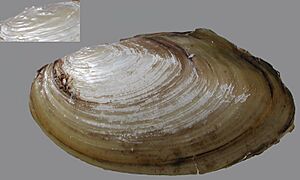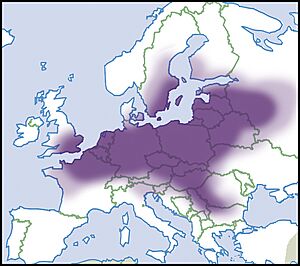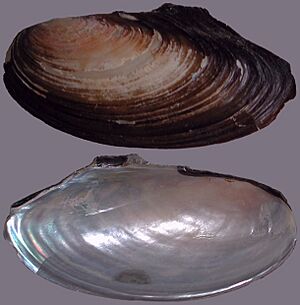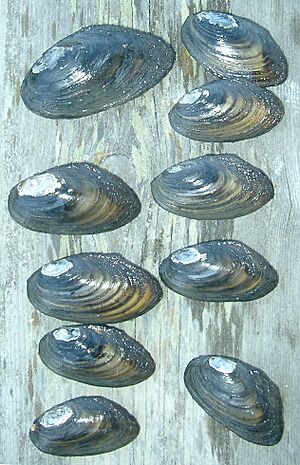Depressed river mussel facts for kids
Quick facts for kids Depressed river mussel |
|
|---|---|
 |
|
| Left valve of Pseudanodonta complanata showing close-up of rugae on the umbo | |
| Conservation status | |
| Scientific classification | |
| Genus: |
Pseudanodonta
|
| Species: |
complanata
|
 |
|
| Distribution of Pseudanodonta complanata in Europe. | |
| Synonyms | |
|
Anodonta complanata Rossmässler, 1835 |
|
The depressed river mussel (also called the compressed river mussel) is a special kind of freshwater mussel. Its scientific name is Pseudanodonta complanata. It's an aquatic animal with two shells, like a clam. These animals are part of a group called mollusks. They belong to the family Unionidae, which are known as river mussels. The mussel's name comes from its flat, or "depressed," shell shape.
You can find this species across northern Europe. However, it is considered endangered in many places. This means there are not many of them left, and they are at risk of disappearing.
Scientists think that pollution and the digging up of riverbeds (called dredging) are big threats to these mussels. They live in slow-moving parts of rivers and streams. It's also possible that there are more mussels than we know. This is because they can be hard to spot. They look very similar to other young mussels, like Anodonta anatina or Anodonta cygnea. Because they are "easily overlooked," their numbers might be higher than current records show.
Where They Live
The depressed river mussel is native to Europe. It has been found in many countries:
- Czech Republic: It is endangered here. It is especially at risk in Moravia.
- Estonia: They are present in this country.
- Finland: They are not uncommon here.
- Germany:
- They are critically endangered in Germany. This means they are very close to disappearing.
- They are a strictly protected species by law.
- Netherlands: They are present here.
- Poland: They are endangered in Poland.
- Slovakia: They are endangered here.
- United Kingdom: You can find more information in their action plan. They are listed as an endangered species in the British Isles.
- Sweden: They are rare in Sweden.




